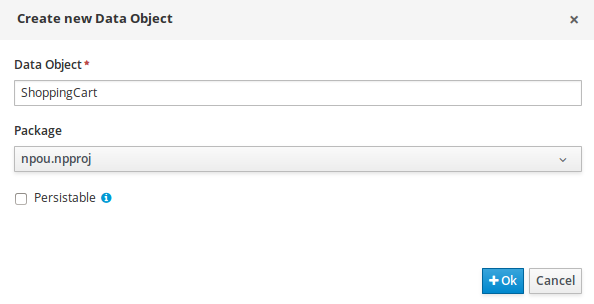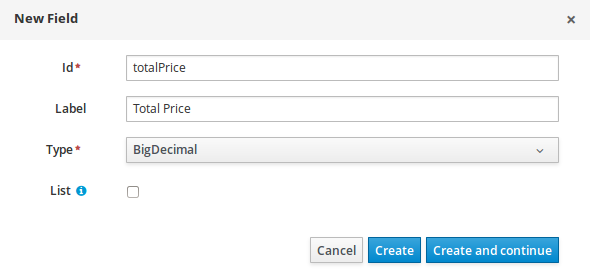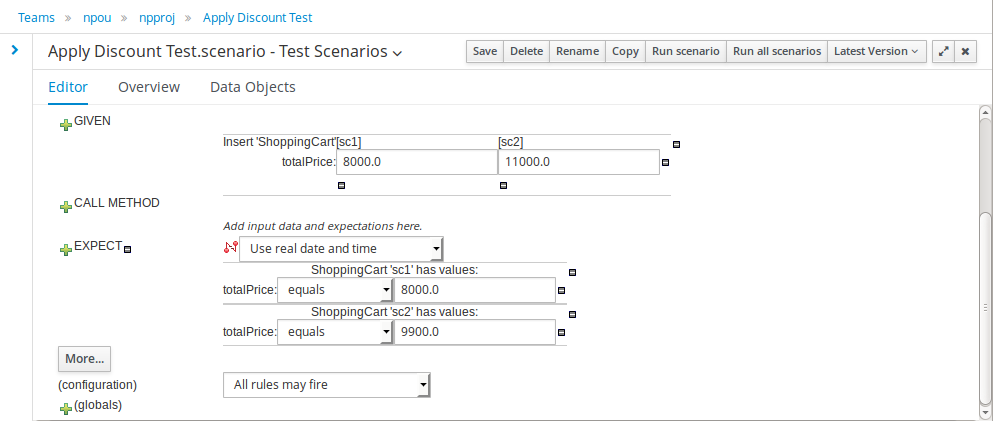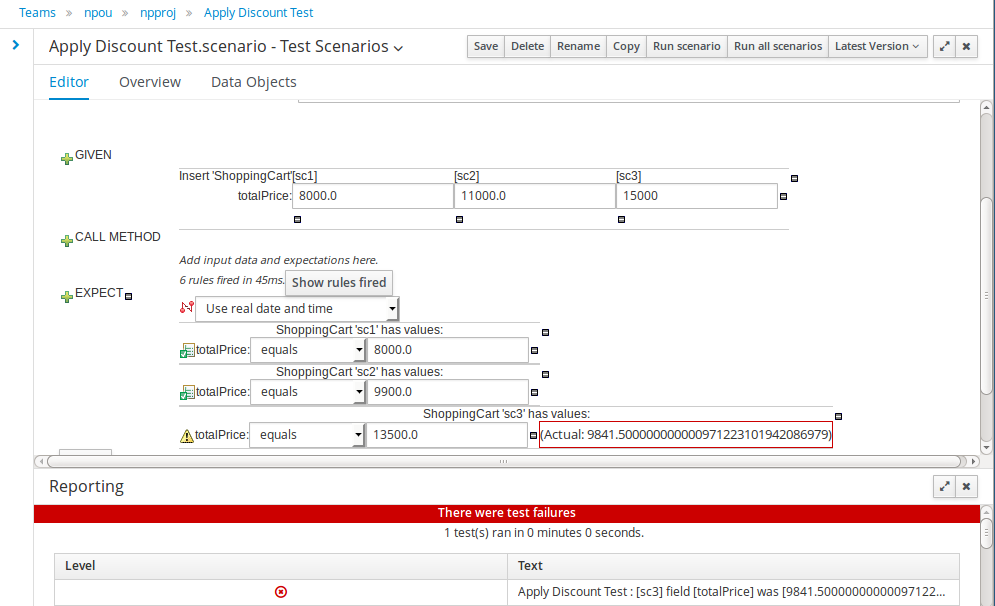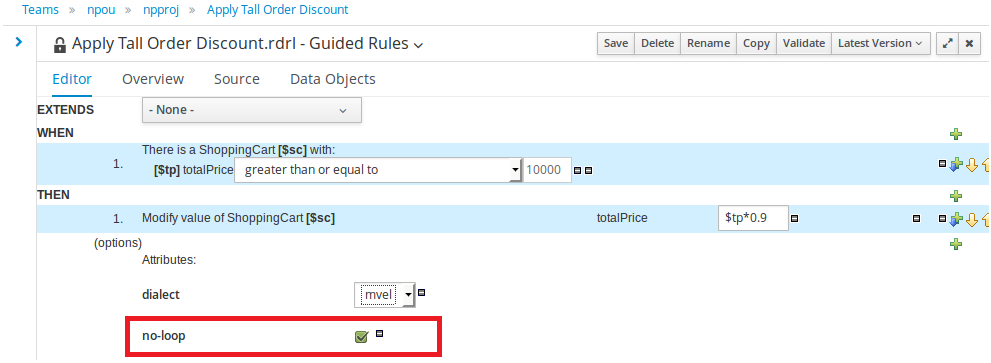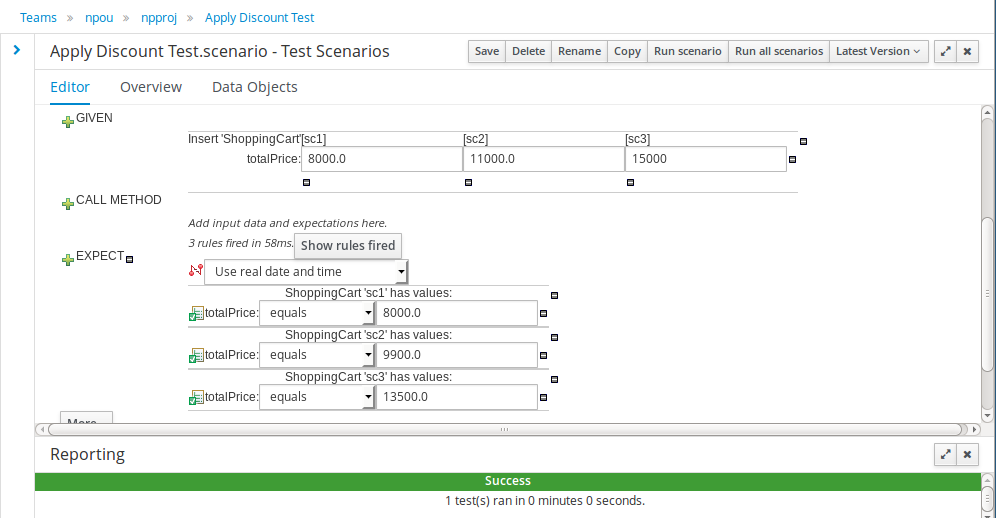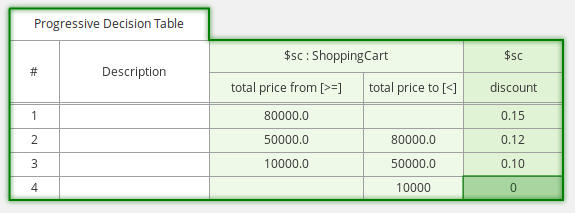Drools KIE introduction
Jump to navigation
Jump to search
Drools Kie
Drools Kie Overview
Business Rules Manager ⌘
- allows people to manage rules in a multi user environment
- single point of truth for business rules
Kie
- Common terms for combining common libraries and other parts of jBPM, Drools and Fusion
- Stands for Knowledge Is Everything
When to use Kie
- versions/deployment of rules,
- let non-technical people create/update/view rules
- embedded in existing applications
- no existing infrastructure
- lots of "business" rules
- can be used on its own, or with the IDE
When to not use Kie
- mostly technical rules
- part of an application rather than corporate solution
- existing infrastructure and GUI
Kie Users
- Business Analysts
- Rule experts
- Developers
- Administrators
- Managers (as documentation and analysis tool)
Features
- Multiple types of rule editors (GUI, text)
- Version control (historical assets)
- Build and deploy
- Store multiple rule "assets" together as a package
- Human Task console
Starting KIE
Starting KIE:
cd /opt/jbpm-server-7.XX.0.Final-dist/bin/
. standalone.shopen a web browser and go to
localhost:8080/jbpm-console (drools 7.10)
localhost:8080/business-central (drools 7.19+)
Apply Discount
Creating a Fact Type ⌘
- Add Asset -> Data Object
- Data Object: ShoppingCart
- Create new field
- Id: totalPrice
- Label: Total Price
- Type: BigDecimal (not supported in test scenarios in version 7.19)
- Save (upper right corner)
Looking at generated POJO
- Switch to Source tab
package npou.npproj;
/**
* This class was automatically generated by the data modeler tool.
*/
public class ShoppingCart implements java.io.Serializable {
static final long serialVersionUID = 1L;
@org.kie.api.definition.type.Label(value = "Total Price")
private java.math.BigDecimal totalPrice;
public ShoppingCart() {
}
public ShoppingCart(java.math.BigDecimal totalPrice) {
this.totalPrice = totalPrice;
}
public java.math.BigDecimal getTotalPrice() {
return this.totalPrice;
}
public void setTotalPrice( java.math.BigDecimal totalPrice ) {
this.totalPrice = totalPrice;
}
}
Drools Kie - Example
Creating a Rule
- Add Asset -> Guided Rule
- Resource Name: Apply Tall Order Discount
- Enter details as below
- View Source should return
package npou.npproj;
import java.lang.Number;
rule "Apply Tall Order Discount"
dialect "mvel"
when
$sc : ShoppingCart( $tp : totalPrice >= 10000.0B )
then
modify( $sc ) {
setTotalPrice( $tp*0.9 )
}
end
Creating a Test Scenario (Legacy)
- Create New Asset-> Test Scenario (Legacy)
- Resource Name: Apply Discount Test
- Run Scenario
Creating a Test Scenario
- Create New Asset-> Test Scenario
- Resource Name: Apply Discount Test 2
- Run Scenario
Dealing with Recursion
- Let us try to add a test for order value of 15000 and set EXPECT section to 13500
No-Loop Attribute
We need to ad no-loop attribute
package com.nobleprog.npproj;
import java.lang.Number;
rule "Apply Tall Order Discount"
dialect "mvel"
no-loop true
when
$sc : ShoppingCart( $tp : totalPrice >= 10000.0B )
then
modify( $sc ) {
setTotalPrice( $tp*0.9 )
}
end
- Correct test should look like that
Exercises
Exercise 1
- to the shopping cart fact type add "discountApplied:Boolean" field,
- set it to true after applying a discount
- modify rule so it will work without no-loop or other attributes
Drools Kie - Decision Table
Applying Progressive Discounts
We want to apply discounts according to the table below:
0 - 9,999 -> 0% 10,000 - 49,999 -> 10% 50,000 - 79,999 -> 12% 80,000 - above -> 15%
Modification to previous scenario
- In Data Objects -> ShoppingCart add a new field discount:Double
Guided Decision Table
- Create New Asset -> Guided Decision Table
- Name: Progressive Discount Table
- Hit Policy - None
Exercises
Exercise 1
- Implement the decision table above
- Test if it works
Exercise 2
- Create another rule which would calculate totalPrice after discount has been applied
Exercise 3
- Add a condition to stop looping (2 solutions)
Applying Progressive Discounts - Source
- View Source
package npou.npproj;
//from row number: 1
rule "Row 1 Progressive Decision Table"
dialect "mvel"
when
$sc : ShoppingCart( totalPrice >= 80000.0B )
then
modify( $sc ) {
setDiscount( 0.15B )
}
end
//from row number: 2
rule "Row 2 Progressive Decision Table"
dialect "mvel"
when
$sc : ShoppingCart( totalPrice >= 50000.0B , totalPrice < 80000.0B )
then
modify( $sc ) {
setDiscount( 0.12B )
}
end
//from row number: 3
rule "Row 3 Progressive Decision Table"
dialect "mvel"
when
$sc : ShoppingCart( totalPrice >= 10000.0B , totalPrice < 50000.0B )
then
modify( $sc ) {
setDiscount( 0.10B )
}
end
//from row number: 4
rule "Row 4 Progressive Decision Table"
dialect "mvel"
when
$sc : ShoppingCart( totalPrice < 10000B )
then
modify( $sc ) {
setDiscount( 0B )
}
end
Knowledge Session
Stateless Knowledge Session
- A stateless session can be called like a function passing it some data and then receiving some results back.
- Some common use cases for stateless sessions are, but not limited to:
- Validation
- Is this person eligible for a mortgage?
- Calculation
- Compute a mortgage premium.
- Routing and Filtering
- Filter incoming messages, such as emails, into folders.
- Validation
- Stateless sessions do not support iterative insertions and the method call fireAllRules()
- The act of calling execute() is a single-shot method that will internally instantiate a KieSession, add all the user data and execute user commands, call fireAllRules(), and then call dispose()
Stateful Knowledge Session
- Stateful Sessions are long lived and allow iterative changes over time.
- Some common use cases for Stateful Sessions are, but not limited to:
- Monitoring
- Stock market monitoring and analysis for semi-automatic buying.
- Diagnostics
- Fault finding, medical diagnostics
- Logistics
- Parcel tracking and delivery provisioning
- Compliance
- Validation of legality for market trades.
- Monitoring
kmodule.xml
The kmodule.xml file is the descriptor that selects resources to knowledge bases and configures those knowledge bases and sessions.
<kmodule xmlns="http://jboss.org/kie/6.0.0/kmodule">
<kbase name="kbase1">
<ksession name="ksession1"/>
</kbase>
<kbase name="kbase2" packages="org.some.pkg">
<ksession name="ksession2"/>
</kbase>
<kbase name="kbase3" includes="kbase2" packages="org.some.pkg2">
<ksession name="ksession3"/>
</kbase>
<kbase name="kbase4" packages="org.some.pkg, org.other.pkg">
<ksession name="ksession4"/>
</kbase>
<kbase name="kbase5" packages="org.*">
<ksession name="ksession5"/>
</kbase>
<kbase name="kbase6" packages="org.some.*">
<ksession name="ksession6"/>
</kbase>
</kmodule>- 'kbase1' includes all resources from the KieModule.
- The other KieBases include resources from other selected folders, via the 'packages' attribute.
- Note the use wildcard '*' use, to select this package and all packages below it.
